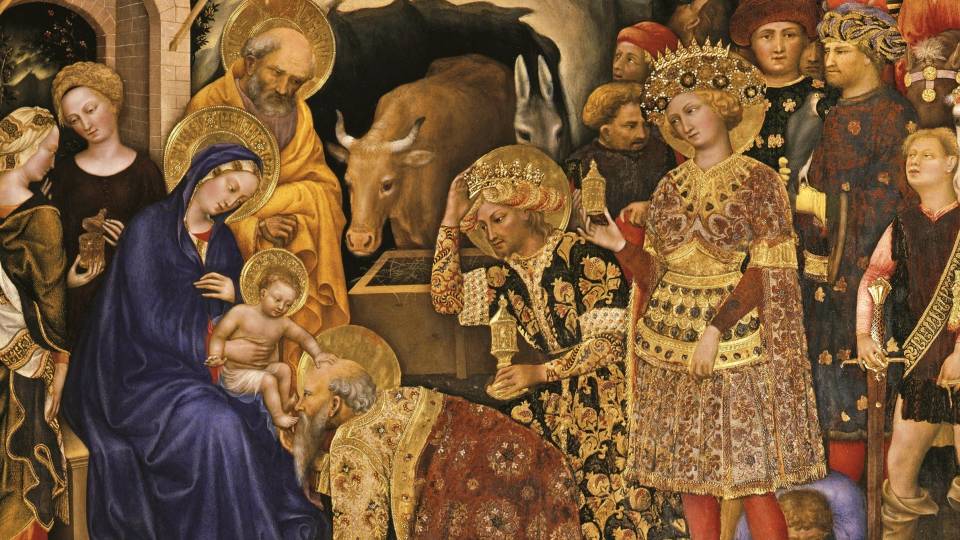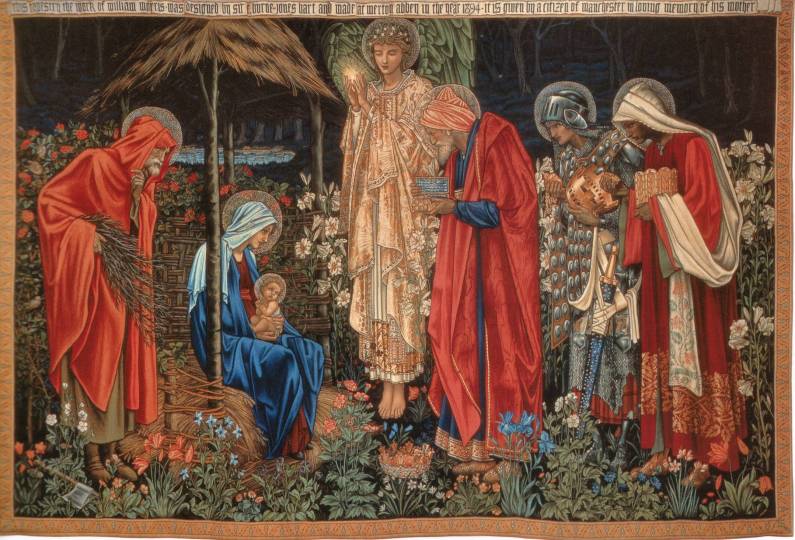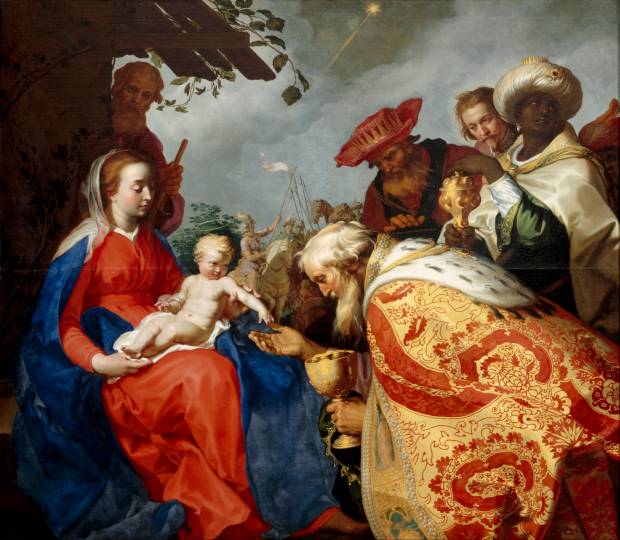One of my favourite Christmas songs goes, “O come, all ye faithful, joyful and triumphant. O, come ye, o come ye to Bethlehem.” I like it because I think that’s what Christmas is about. That’s what our Christian living is about: going to Bethlehem.
But today we celebrate the Feast of the Epiphany (traditionally celebrated on January 6th), when we hear about the visit of the Wise Men, and there is another song that you may hear about three kings of Orient who traverse afar.
Epiphany is a word that means “manifestation”. God is revealed to us at his Nativity with the revelation to the Gentiles (Matthew 2:1-12), at his Baptism (Matthew 3:13-17; Mark 1:1-11; Luke 3:21-24 and John 1:30-34), and at the Wedding of Cana (John 2:1-12). You can read more about this in my
Deacon-structing Jesus’ Baptism.
Today’s “epiphany” teaches us something very important about our journey as Christians. These Wise Men from the East, who were not Jews, teach us something very important about finding the Truth, about finding Christ. They knew that God could be found, but in order to do so, we have to go on a journey; we have to go to Bethlehem.
The Adoration of the Magi by Edward Burne-Jones and William Morris (Source: Wikimedia Commons)
There are seven things that I think the Wise Men can teach us about how to get to Bethlehem.
First: The Wise Men knew that they were searching for the newborn King of the Jews. That means that they studied sacred writings and scripture. If we want to find Truth, if we want to find God, before we get to Bethlehem, we have to study religion. We have to read spiritual authors. We have to study sacred writings. I feel that I am always writing and speaking about this: If you want to find God, if you want to get to Bethlehem, a good place to start is with the Scriptures and with sacred and Church writings.
Second: The Wise Men followed a star. That means that they were not only looking for God’s revelation in sacred writings but also in the created world. The Catholic Church teaches that God reveals himself in his Word but, first, through his creation. That’s why we have beautiful Psalm 19, which says that “the heavens declare the glory of God”. Everything that God creates points to him. And if everything in creation can be studied and measured through science, then science can lead us to Truth and that points to God. If we do this, we will find that there is no contradiction between faith and reason or faith and science. If we want to get to Bethlehem, we have to follow the star – but not astrology; that’s not science; that’s superstition. But astronomy, physics, mathematics... science.
Third: The Wise Men asked for directions. We have to recognize that studying Scripture and looking for God in his creation can only take us so far. There are so many other people who’ve already gone on this journey and we need help; we are not on this journey alone. There are people who are further ahead on the journey that can help us. Even people who are further behind on the journey can help us. The Wise Men asked Herod for direction; Herod was not a very godly man. But God can use anyone to point us in the right direction. The key is to be truly searching for the Truth. I tell everyone who is serious about their Christian journey to get a spiritual director. If you want to know what that is and how it works, ask your priest or deacon. If you want to get to Bethlehem, ask for direction.
Fourth: When the Wise Men arrived in Bethlehem, they entered. At some point in our journey, we have to enter. Sometimes we are comfortable continuing to search and search and we never enter; we stay outside. Even when we go to Mass, we may enter the building, but we never actually enter into the Mystery; we never enter into the celebration. If you want to meet Christ in Bethlehem, you have to enter; otherwise it’s very hard for Christ to enter into your heart.
The Adoration of the Magi by Abraham Bloemaert (Source: Wikimedia Commons)
The Wise Men prostrated themselves and paid Him homage. I think this is something we all find hard to do because worship is not something that we do day-to-day: we don’t go around worshipping things or people. So I think the idea of worshipping God makes us uncomfortable. But we do admire people. And when we love someone, we do tell them that we love them. We praise them: we tell them that they look good. Sometimes we even say that we adore them. Do we love God enough to say that we adore Him? When we are at Mass, do we worship? Do we glorify Him when we sing the Gloria? Are we praising Him when we sing the Holy, Holy? When the priest raises the Blessed Sacrament – “Behold the Lamb of God...” – do we praise and glorify Him? If we want to find Christ in Bethlehem, we have to adore Him.
Sixth: The Wise Men gave Him gifts. Do you come expecting only to receive? What do you bring to this relationship? Your best gift may not be gold, frankincense, and myrrh. Your best gift is that of the little boy who had no gift to bring so he played his drum for Him; he played his best for Him. Your best gift is yourself. If you want to find Christ in Bethlehem, you have to bring something into the relationship. I am going to suggest that the best thing to give Him is the gift of yourself.
Seventh: The Wise Men departed by another way. When you meet Christ, you have to go back a different way. You can’t go back the same way; you can’t go back to the same ways; you have to go back a different way. Meeting Christ transforms us. If you want to meet Christ in Bethlehem, you have to be willing to change your ways; you have to be willing to go back by another way.
If we truly want to find Christ, we have to be willing to go on a journey. The Wise Men didn’t just stay put; they went on a journey. If you want to find Christ, you have to search. You have to search through spiritual writings and also through God’s creation. You have to ask for directions; you have to enter; you have to pay Him homage; you have to give yourself as a gift; and you have to be willing to return by another way.
If we do this, we will find that we are more than ready to sing, not about a “star of wonder, star of night”. Instead, we will be more than ready to sing: “O come, let us adore Him; o come, let us adore Him; o come, let us adore Him, Christ, the Lord!”

Every week, Deacon Pedro takes a particular topic apart, not so much to explore or explain the subject to its fullness, but rather to provide insights that will deepen our understanding of the subject. And don’t worry, at the end of the day he always puts the pieces back together. There are no limits to deaconstructing: Write to him and ask any questions about the faith or Church teaching:
[email protected]



 Every week, Deacon Pedro takes a particular topic apart, not so much to explore or explain the subject to its fullness, but rather to provide insights that will deepen our understanding of the subject. And don’t worry, at the end of the day he always puts the pieces back together. There are no limits to deaconstructing: Write to him and ask any questions about the faith or Church teaching: [email protected]
Every week, Deacon Pedro takes a particular topic apart, not so much to explore or explain the subject to its fullness, but rather to provide insights that will deepen our understanding of the subject. And don’t worry, at the end of the day he always puts the pieces back together. There are no limits to deaconstructing: Write to him and ask any questions about the faith or Church teaching: [email protected]